19+ Music Business Card Examples to Download
How often will listen to songs everyday? Once? Twice? Or are you just putting on your headphones the whole day listening to non-stop music?
No matter how often are you listening to music everyday, it is undeniable that music has become part of our culture and our everyday lives. Imagine your room without music and you are alone. Imagine a wedding event without music. Imagine a party without music. Imagine your life without music. Does it feel good? Or are you bothered of the thought of how deadly the silence can become if music will be absent in our lives?
Whether you are a music lover or not, we oftentimes, if not always, wanted to listen to songs especially to our favorite genres. Music has become part of our relaxation and refuge at times when we want to chill or just want to free ourselves from the pressures of life.
But, aren’t you wondering who are involved in the process of creating this music? Who prepared the musical scores? Who arranged the song? Who is involved in audio mixing? Who is directing the overall production of the music? Usually, we do not know who is behind every song. But, we know for sure who sang a certain song or who are the members of the band that performs the song.
Of the many people involved in creating, performing, teaching, practicing, and enhancing music, all we know is that they have different roles in the music industry, even the music enthusiasts as well. And if you are one of them (you are, certainly, because you stumbled upon this article and you’ve read this far), did you know how to market your name in the industry? How will you let people know that you are offering services regarding music or you are a performer or you know how to tinker gadgets relating to music?
Well, marketers have long found a certain marketing strategy that has been widely used by many businessmen and entrepreneurs and everyone who is engaging in business. This marketing strategy has been used for centuries and is still used by us today. You might think that this is somewhat cliche since almost everybody is having it. But, you might want to think again: why is everybody adopting the idea? There might be something in this marketing strategy that makes it efficient and the reason why many are still using it.
We are talking about business cards. Business cards serve as a marketing tool for ages ago today. It is our common knowledge to have business cards especially when we are offering goods and services and we want people to contact us. Certainly, people in the music industry need to have business cards for branding and promotion.
Business cards should represent the name placed therewith and must be your representation or the face of your company. So, you should take the designing of music cards seriously as it affects the reaction and feedback of the customers. But, don’t worry; we are here to assist. To help you with the design, check out the examples below. But before that, let us take a quick peek at the importance of business cards and the reasons why musicians must have business cards.
Why Musicians Must Have Business Cards
Similar to business people, musicians, too, need business cards for a lot of reasons and some of them are discussed below.
1. Marketing
Firstly, musicians, especially teachers, tutors, band members, DJs, music specialists, etc., need to endorse their names to the public. How can you become a known musician if you will not find ways to promote your name? To answer this great need of musicians in their branding, an effective marketing tool should be used—business card. In this way, musicians can endorse their names in the market through that small piece of paper which contains the important information of that musician. Business cards can greatly help them in a way that people will know them and will remember them when they are needing the service of the musician. There are many services offered by musicians. Among those are as follows:
- Music composer
- Arranger
- Producer
- Audio services (such as editing, mixing, restoration, and design)
- Vocal coach
- Sound engineer
- Audio engineer
- Audio technician
- DJ
- Vocalist
- Drummer
- Keyboardist
- Lead
- Bassist
- Music director
- Instrument teacher or tutor
2. Networking
Of course, when you are handing out your business card, you are expecting that that person you are handing your card to has a lot of connections that might be your prospective client. Networking is the easiest way to disseminate the information that you are offering. With this, even if you are not physically distributing your business card to all the people, it will still be quickly spread to a wide range of people. You don’t have to do all the effort; instead, you just to have a lot of connections.
3. Inexpensive Marketing
In business, we always want to lessen our expenses to have the maximum profit. It is a common knowledge that we don’t want to spend an amount equal or more than how much we get from it. Because of that, we cut costs especially those that are irrelevant to the product. To minimize cost, we use promotional materials where we can spend less but is still effective in spreading your advertisement and that when business cards are introduced. Because business cards are just a small piece of thing, it is inexpensive compared to other promotional materials.
4. Customizable
You can customize your business card in any way you want because you are literally free to add what you want to add in your details. Just make sure that you are stating facts and not a mere exaggeration of your advertisement or promotion. Aside from the information, you can customize the design, color, font, format, and anything that appears on the face of your business card. However, you have to take note that your design must not overpower the details nor your design is just plain and boring. You have to think of creative ways on how to design your card in a unique and eye-catching way. Or, you may refer to our examples below for the different designs that will surely fit your position and promotion of your business card.
5. Convenient
Because business card comes in small sizes, they are very handy and convenient. Imagine you can just insert them into the pages of your book or notebook or place them in your pocket or wallet. It does not consume a lot of space and you need not worry about disposing of them. On the side of the owner of the card, business cards are easier to disseminate compared to other promotional tools as you can carry a lot of them in a single box or just place it inside your bag. And before I myself forget, you have to remember to bring your business cards all the time, with more than a dozen of copies of course, just in case you meet someone who needs your contact details or you just randomly want to drop off your business cards in stores or shops where you have just visited.
Examples of Music Business Cards
Here are the different examples of business cards that will fit your profession as a musician; whether you may be a singer, a player of a certain instrument, a music instructor, a sound technician, or anything related to music, you can find your business card here.
Musician Business Card Template
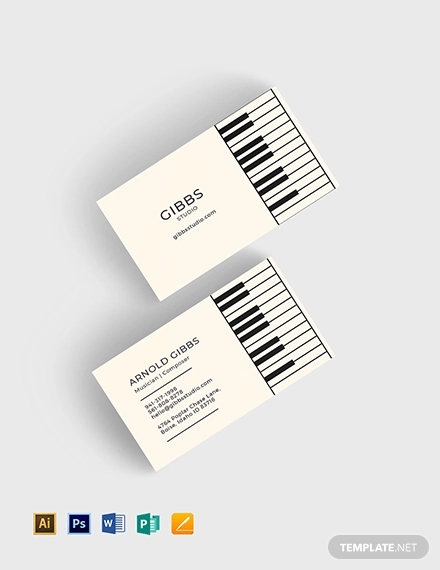
Music Band Business Card Template
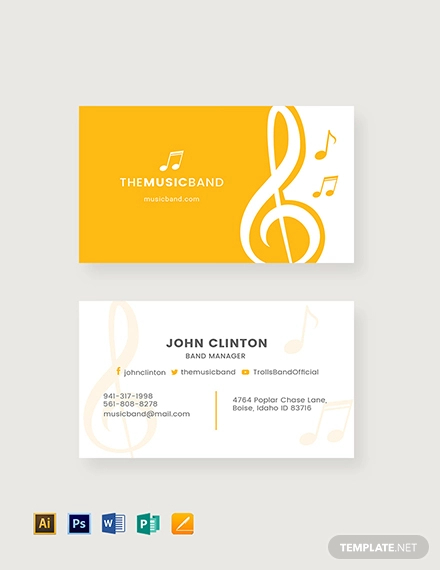
Audio Engineer Business Cards

Customizable Music Business Card

Custom DJ Promoter Business Cards

Black Stripes Producer Business Card
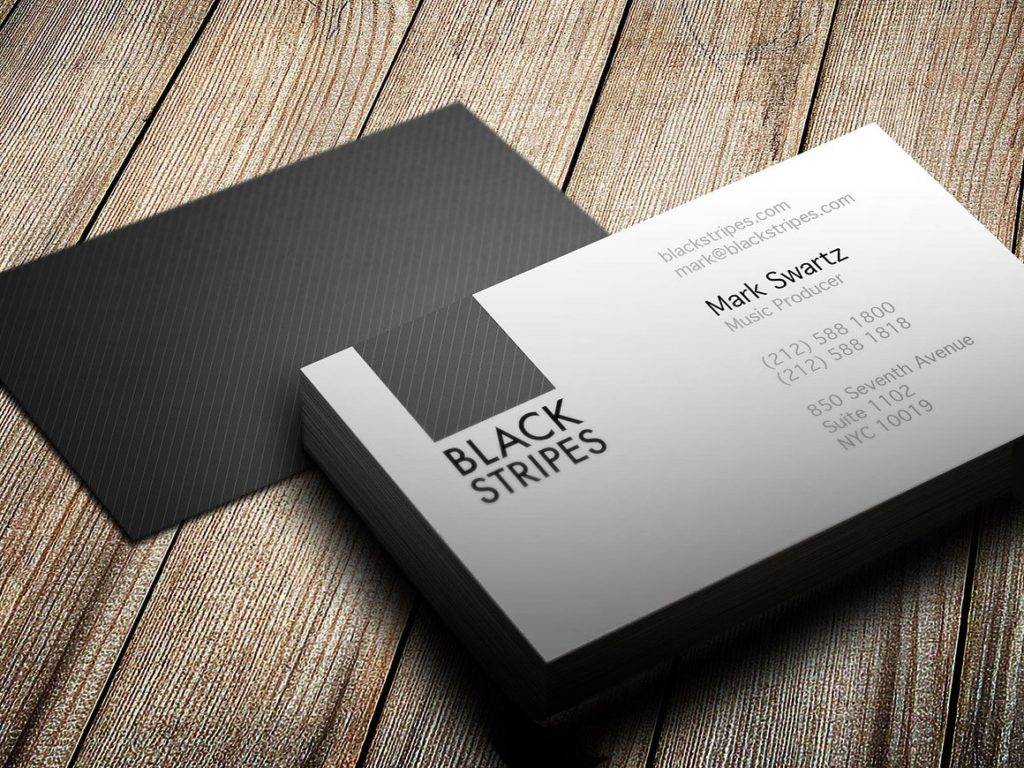
Creative Music Business Card

Music Producer and DJ Business card
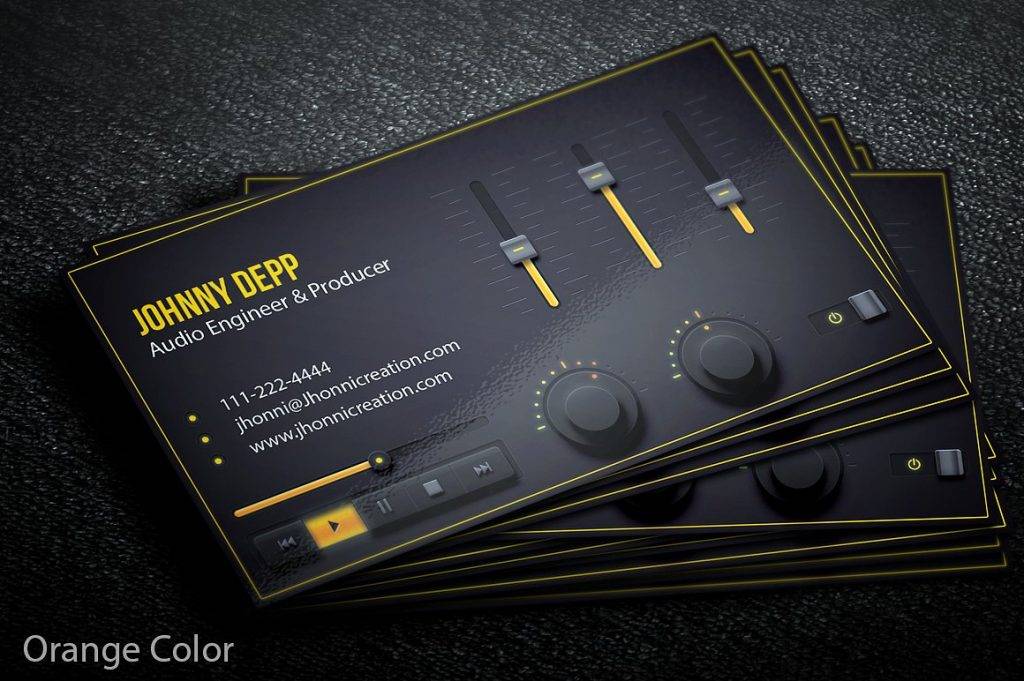
Grunge Music Business Card
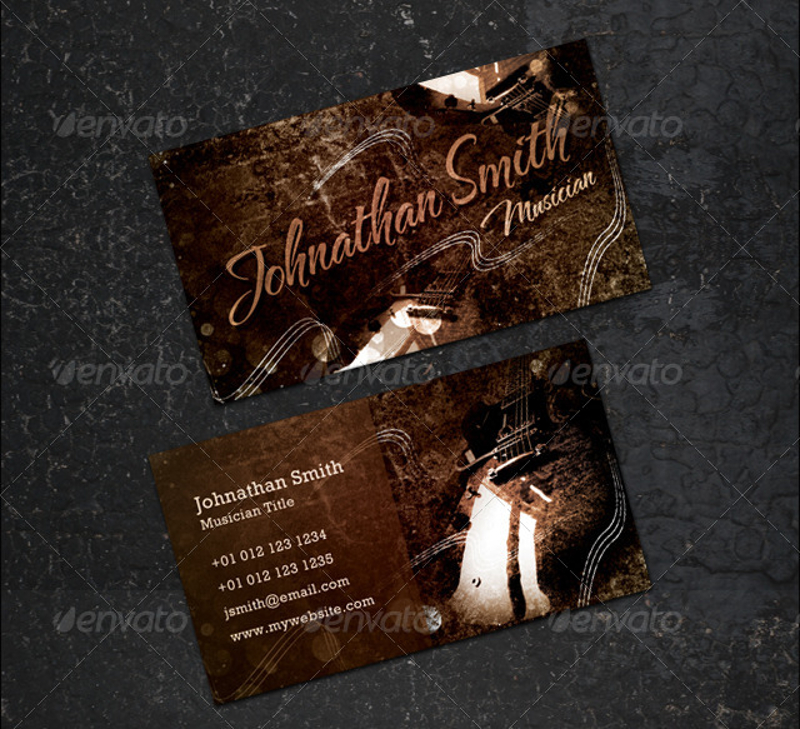
Musician Piano Black and White Business Card
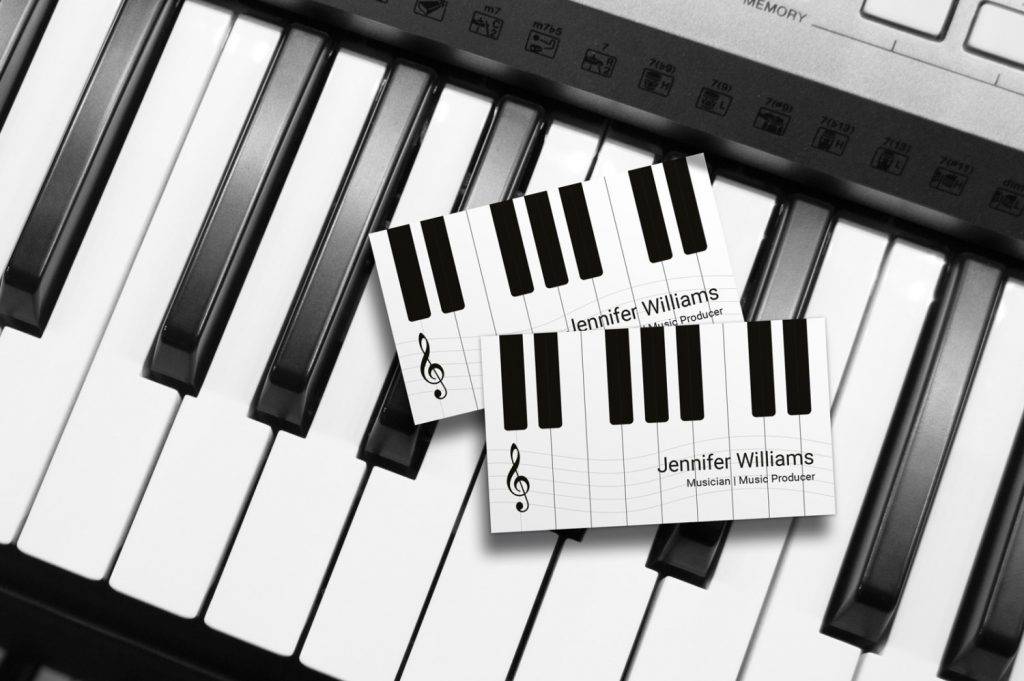
Music Producer Business Card
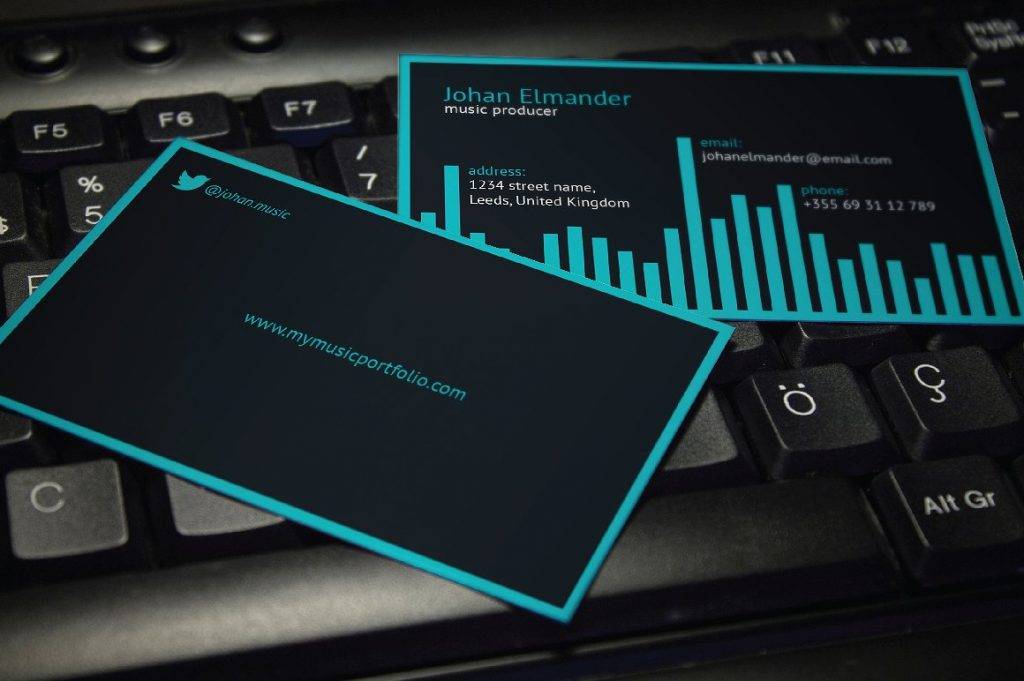
Musical Business Card
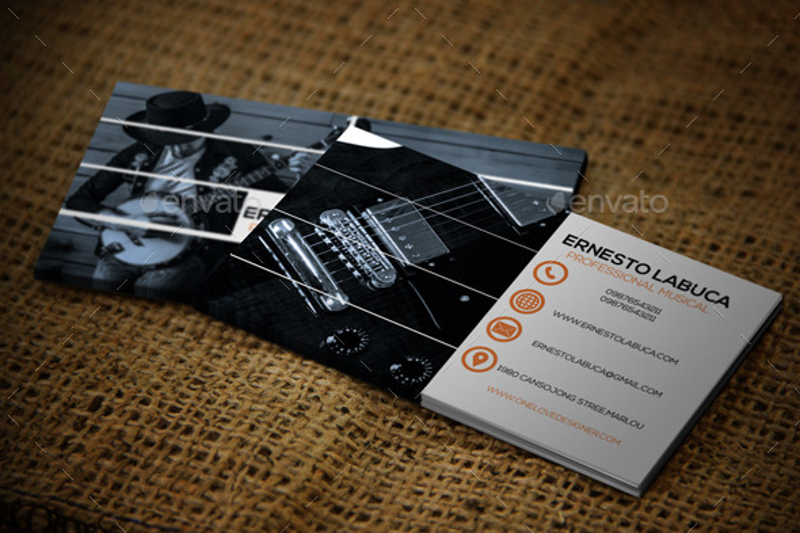
Colorful Business Card PSD

Sound Engineer Business Card
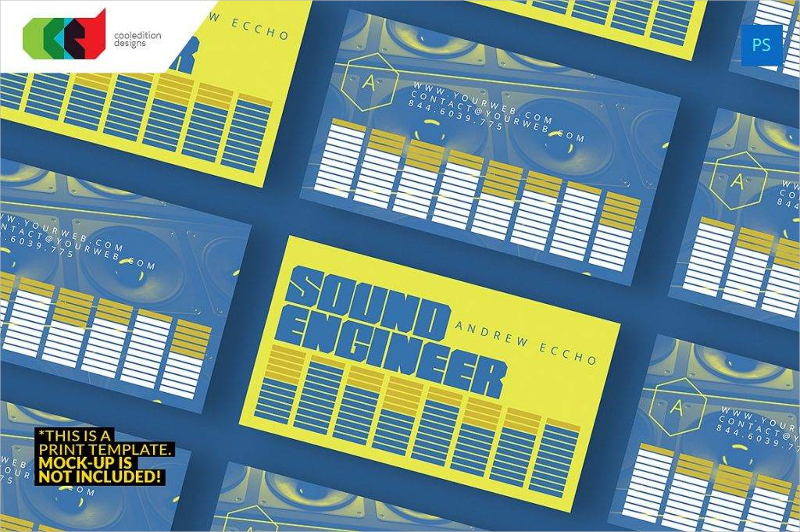
Dark and Light Music Business Card

Night Club Business Card
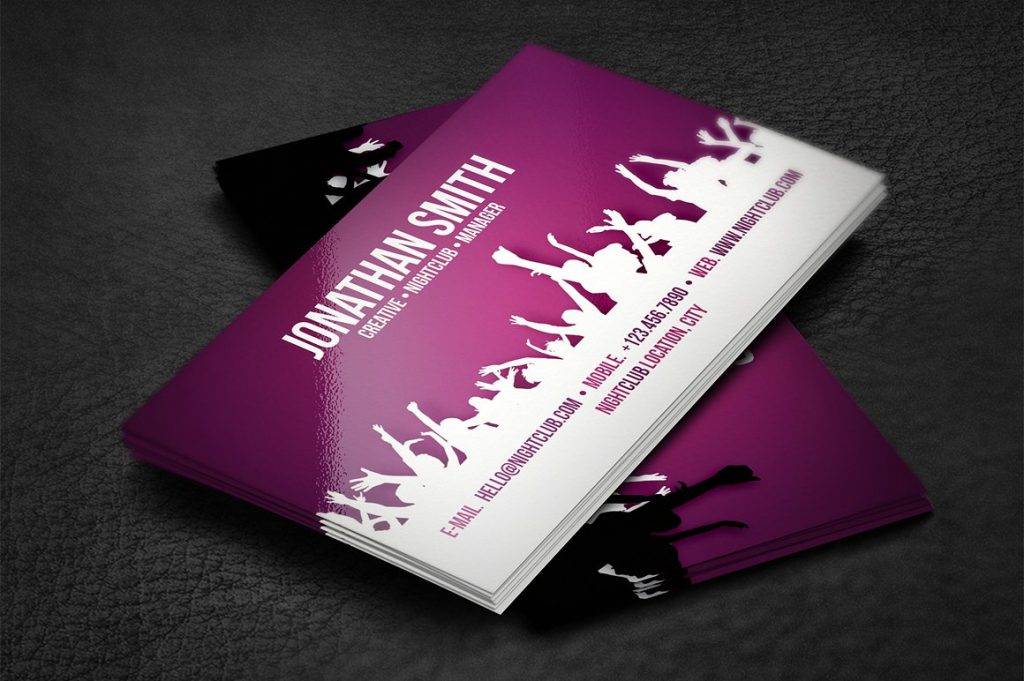
Heaven Design Music Business Card
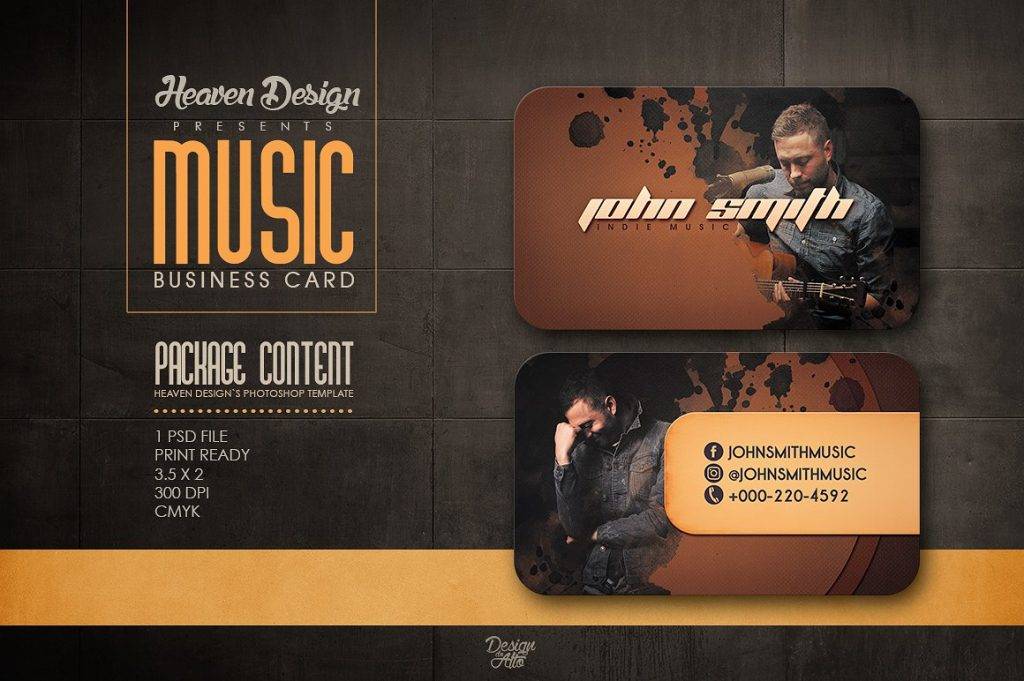
Classy Musical Business Card

Music Studio Business Card
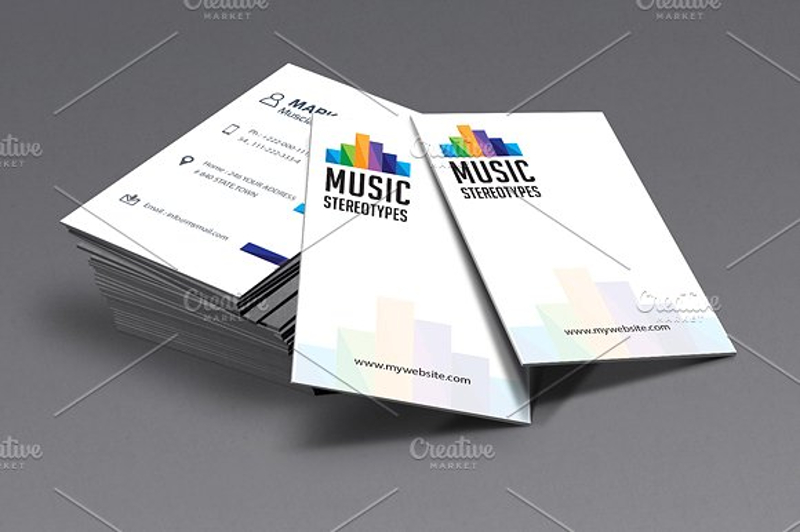
Different Music Genres
For the sake of music lovers and those who want to explore music more, you might want to know these different music genres and compare one from each other. Other people prefer a certain genre from another because of its beat, rhythm, musicality, and instruments used. On the other hand, others are not particular in choosing a genre and just wanted to listen to different types of music. So, here are the broad categories of genres and their sub-categories.
1. Alternative
The widely known types of alternative music are alternative rock, experimental rock, gothic, grunge, hardcore punk, punk, and hard rock. Alternative rock is characterized by its musicality where it is being defined as a less intense version of rock but a more intense version of pop. As per Merriam, alternative music is a “music that is produced by performers who are outside the musical mainstream, that is typically regarded as more eclectic, original, or challenging than most popular music (such as conventional rock, pop, or country), and that is often distributed by independent record labels.”
2. Blues
Blues is a type of music that is inclined to jazz or popular music using harmonic and phase structures of blues. It is also characterized by its lyrics, bass lines, and instrumentality. Popular types of blues are acoustic, classic, and country blues.
3. Classical
Classical music includes Baroque, chamber music, choral, impressionist, medieval, renaissance, opera, and also wedding music. Most people find classical music as relaxing, can relieve stress, and can help them relax. This is usually characterized the performance of complex forms of solo instrumental works. It is said that its repertoire is written down in musical notation which creates a musical part or score.
4. Country
It is said that country music has its roots in folk music and blues. It consists of ballads, folk lyric, and harmonies with string instruments as an accompaniment. Country music includes contemporary country music, alternative country music, traditional bluegrass, and traditional country music.
5. Electronic Dance Music (EDM)
Electronic dance music is usually used for parties or dances in nightclubs, raves, and festivals. These are usually played by DJs where they can create a mix, a loop, or play with the song. These are popular nowadays because they are also being played on radios and televisions and become a part of the lives of each of us. Commercials and advertisements also use this type of music in their jingle for the promotion of their product or services. The different subcategories for EDM are breakcore, dubstep, electro-house, garage, hardcore, glitch hop, glitch pop, hard dance, trance, rap, and techno.
6. Electronic
Electronic music is usually characterized by its use of electronic musical instruments, digital instruments, and circuitry music technology. Circuitry music technology. You can see the distinction between sound produced by electromechanical means and the ones produced using electronics only. Electromechanical instruments include strings, hammers, magnetic pickups, power amplifiers, and loudspeakers. Meanwhile, electronic instruments do not have vibrating strings, hammers, or other sound-producing mechanisms. Electronic music includes ambient, bassline, chillwave, crunk, downtempo, electro, electronica, electronic rock, and industrial.
7. Hip-Hop/Rap
We oftentimes hear this genre played everywhere as this is also one of the common genres nowadays. We can usually distinguish rap because of its characters such as it is like a spoken song or a vocal delivery that goes with the beat of a song. The components of a rap include a content of the song or the rap, the flow of the rap including its rhyme and rhythm, and way the rapper delivers the rap and the tone and projection. It is almost always associated with hip-hop music. Its subcategories include alternative rap, bounce, hardcore rap, and underground rap.
8. Christian/Gospel
Christian music is a very broad music type since this encompasses different music types only that it has a religious content and the lyrics are without profane or coarse language. Some people usually have misinterpretation when it comes to Christian music. They will instantly perceive Christian music as being solemn or music with peaceful and serene instrumentality. This misconception leads to others not wanting to hear Christian music or, for some, get bored when you say you will play or perform Christian songs. But the truth is, Christian music has adopted different music styles, even metallic rock. An example of a metal band performing Christian song is the Skillet. The different sub-categories of Christian music include Christian metal, Christian pop, Christian rap, Christian rock, classic Christian, contemporary gospel, praise and worship, and traditional gospel.
9. Jazz
Jazz is characterized by propulsive syncopated rhythms, polyphonic ensemble playing, varying degrees of improvisation, and often deliberate distortions of pitch and timbre and as the product of group creativity, interaction, and collaboration, which places varying degrees of value on the contributions of the composer and performers and is developed especially from ragtime and blues. It is said that jazz is perceived by many as “America’s classical music.” Its composition and style have changed throughout the years and is improvised by the different performers depending on his or her interpretation. Jazz includes these sub-genres: acid jazz, Avant-Garde jazz, blue note, contemporary jazz, crossover jazz, cool, fusion, hard bop, Latin jazz, mainstream jazz, smooth jazz, and trad jazz.
10. Pop
Pop music is usually used interchangeably with popular music. It is characterized by short to medium-length songs written in a basic format and the use of repeated choruses, melodic tunes, and hooks. It adopts different music styles such as urban, dance, rock, Latin, and country music. Pop includes Britpop, chamber pop, dance-pop, electro pop, orchestral pop, pop punk, power pop, and teen pop.
11. R&B/Soul
The bands playing rhythm and blues, commonly abbreviated as R&B, usually consisted of piano, one or two guitars, bass, drums, saxophone, and sometimes background vocalists and sometimes accompanied by background vocalists. The singers are usually cool and relaxed while they are immensely emotionally engaged with the lyrics. The music typically followed predictable patterns of chords and structure. Examples of the sub-genres of R&B or soul includes contemporary R&B, doo-wop, funk, neo-soul, quiet storm, and soulful blues.
12. Reggae
Reggae is characterized by its musicality lead by drum and bass. It incorporates some of the musical elements of rhythm and blues and jazz as it is strongly influenced by traditional mento as well as American jazz and rhythm and blues. Reggae is usually recognizable because of its offbeat rhythms; its tempo is slower than ska but is faster that rocksteady although it is distinctive from rocksteady in a way that it dropped any of the pretensions to the smooth and soulful sound and being dependent on the rhythm section to drive it along. Sub-genres of reggae are as follows: dancehall, dub, and roots reggae.
13. Rock
Rock is also one of the broad genres encompassing different types of sub-genres relating to other types of genres. It originated as rock and roll in the USA but eventually developed into different styles. It is influenced by a number of genres such as blues, rhythm and blues, electric blues, country music, folk, jazz, and classical music. The lyrics usually presented romantic love although other themes may also be addressed such as social and political. A number of distinct rock music sub-genres had emerged: math metal, math rock, roots rock, blues rock, folk rock, country rock, raga rock, and jazz-rock, psychedelic rock, progressive rock, glam rock, punk rock, and alternative rock. It has bee widely noticed that alternative rock nowadays dominate the rock music and break into the mainstream in the form of grunge, Britpop, and indie rock.
Generalization
Although the above genres of music may differ from each other, if you are a musician, you can never be biased in appreciating a genre since every genre has its unique characteristic that is different and distinct from the others. It is okay to choose a favorite genre but it is fitting that we all pay respect to other genres as well. The most important thing is that we should never forget to uplift the music industry and music scene because music really plays a huge part of our lives as it brings calmness and relaxation to each of us through the different genres. We may have different favorite genres but it all narrows down to what genre makes us feel comfortable and relaxed when we are listening to music.
The music industry as a whole encompasses a wide range of musicians and every musician is in need to market his or name in the industry, thus the business cards that we discussed above. So, whatever your occupation may be, a music business card is all you need for easy communication to clients as well as other musicians. Now that you know the importance of music business cards and the role that it played in the lives of every musician, we can safely assume that you are already into the making of the business card right now. So better start creating your business card today.


